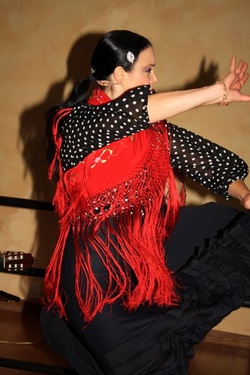
We tend to forget because what we are doing is art. Particularly in Flamenco, we mainly perform at night, in restaurants and bars where the lighting is dark and the liquor is flowing. We female dancers are bedecked with jewelry and flowers in our hair, we've got the smokey eyes going, and we're wearing the long, flowing skirt. Maybe there are ruffles, maybe there's some fringe, maybe there are some polka-dots, sometimes all three are together. The male dancer might have the nice button-down shirt, vest, and slacks, and we all have our top-of-the-line shoes. The Flamenco dancer looks like a work of art before she or he even starts dancing.
Then we dance. The dance IS the work of art itself. Every rhythm brings its own mood to interpret. It's the dancer's job to tell a story and if they are a good story-teller, the audience feels it viscerally and there is the art, manifested.
But to get to this place, there is a lot of work. There are years of training to acquire the right skill level of course, but what we can't forget is that the work is physical and strenuous at times. A standard Flamenco tablao* show is about 45 minutes long. A typical Flamenco solo averages around 10 minutes, definitely longer if you're in a theater setting. Besides the solo, the dancer is required to participate in two or three lighter group numbers and does the palmas (percussive clapping) whenever it is not their actual turn to dance.
On top of that there are classes, practice, and rehearsals.
This requires a lot of stamina. This is why I have to remind myself that dancers are athletes. Therefore, we absolutely must take care of ourselves as athletes. I
First, you need to eat. When I first started taking daily classes in Spain, I lost a ton of weight because I didn't think about the fact that I had increased the amount I was dancing. I also didn't figure in how much I was walking all over town since I didn't drive in Madrid. One day, I learned the hard way that I was not eating enough. It was winter and I was wearing a heavy wool coat. I was carrying an army green messenger bag, full of English textbooks because I taught English in order to make a living. I was leaving a class and walking down the stairs that led to the underground Metro. I felt exhausted and suddenly my books and coat felt really heavy and then the next thing I knew, the bag of books pulled me down the stairs. I landed at the bottom, surrounded by old ladies in fur coats making sure I was alive. My immediate first thought was, "I need to eat more".
Second, and probably more important than anything, you need to sleep. I've been thinking a lot about this one lately. I'm recovering from a summer of doing too much. I was subbing for my friend at a bookkeeping job, doing my volunteer work (I volunteer in hospice and visit four patients on a regular basis), teaching my classes, and performing. I was getting home late from my Flamenco life and getting up early to go to the job. Since I was working during the week and dancing on the weekends, I probably only had about three days off all summer long. Due to the lack of time, and my tendency to be a bit disorganized, I was eating out too much, which meant eating things that weren't optimal (more on that in another post). Eventually I got sick in the weirdest ways: an eye infection, a lymph node infection, and finally I was just plain sick. When this happened, I had to cancel class and a couple of gigs because I hadn't taken care of myself to the point where you could just fight through it. I had reached a point of fatigue. I didn't leave my house for a week.
This brings me to the final point, one I have not been good about because I had forgotten that I'm an athlete. You need to cross-train! The best shape I've ever been in during my professional dance life was when my brother was my personal trainer, making me lift heavy things and doing that horribly named, "burpee" over and over again. During that time, I was able to do weekends full of gigs and recover pretty quickly. Of course, I was also eating well and getting a lot of sleep. You can't do one without the others. Otherwise, you end up fatigued!
Since I'm getting over the fatigue now (the extra job is over) and catching up on sleep, I'll transition back to cross-training gently through yoga, my favorite form of exercise besides dance because it is meditative. The key is doing something that balances you out. The yoga stretches help with the constant slamming of my feet into the ground and the arching of my back.
If you love your art, you have to take care of the tools that help you in your craft. As a dancer, the number one tool is your body. Treat it right, and you'll be able to create for many years. Thanks to Flamenco and its respect for life experience, that could be much longer than you may have dreamed. Don't sell yourself short. Don't forget that you are both an artist and an athlete. Treat your body accordingly.
* tablao--traditional Flamenco show held in a Flamenco bar or restaurant
 RSS Feed
RSS Feed
